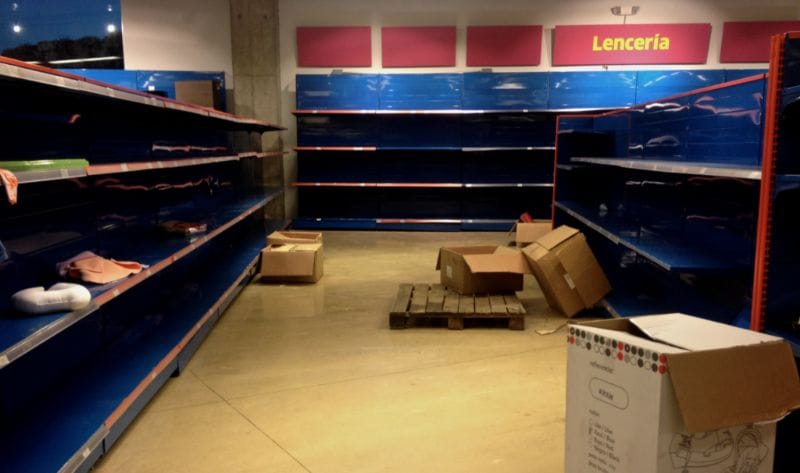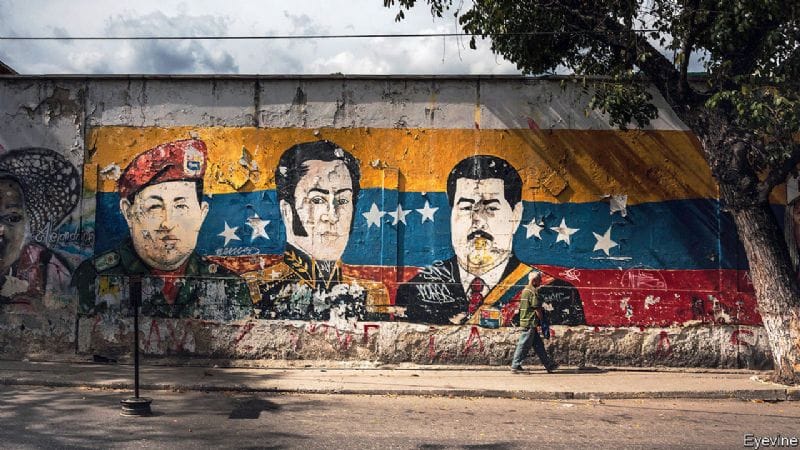Unique Opportunity
Venezuela has been in the news a lot during the
past few years, almost exclusively for all the
wrong reasons. Shocking stories (
and images) have emerged. Lack of jobs, food, access to healthcare, crime, etc, has gone from bad to worse, with no end in sight. The government has also used the real COVID health crisis as
another opportunity to more tightly control its citizens and political opponents.
Two of our teammates here in Peru, a lovely young couple (with a baby on the way), came to Lima from Venezuela two years ago. They are serving as missionaries here, with hopes to minister in China some day soon. In the meantime, they have also been a bridge for us to be able to help the brothers and sisters connected to their network of churches back home in Venezuela.
Since the beginning of the worldwide “lockdowns” (mid-March), we have been able to provide grocery bags for hundreds of families by sending money (safely) through “non-traditional” means. Keep reading for a fascinating first-hand account of what our Venezuelan brothers and sister are experiencing, and what it takes to get help to them.
Venezuela’s Crisis
The political, economic and social crisis that Venezuela has faced since 2016 has been further accentuated by the health crisis we have been facing worldwide due to the Covid-19 pandemic, which has made a big impact on the stability of families and churches in the nation.
Venezuelans have gone through severe periods of food shortages, from cash and gasoline; failures in public services (water, electricity, internet and telephone); hyperinflation, among other things that have all been difficult to endure. Faced with this situation, thousands of Venezuelans chose to emigrate to neighboring countries, while others have found a way to cope with the economic crisis through different means.
During the last months (before the pandemic) there was a period of apparent stability regarding price of the dollar and food products. However, since the beginning of the quarantine prices have doubled, many Venezuelans lost their jobs, and the incomes of those working to make a living day by day began to decrease. It should also be noted that the country’s minimum wage is currently valued at approximately $2 per month.
Unique Challenges for the Church
These circumstances have represented a challenge for the Venezuelan church. There is a great need among church members for both physical and spiritual food. This has fostered unity and brotherly support, even during these times of confinement. The church has done its best to maintain fellowship by phone, through social networks and through online meetings.
These means, however, are not accessible to all members of the congregations. Internet services do not work properly in all households and it has become necessary to resort to other alternatives, such as visits and meetings with few people in the homes. Despite all of these circumstances, the faith of the church has been strengthened, and God has been faithful and has provided for her needs through a variety of means.
 Angel Falls (left) and Caracas (right) are literally worlds apart.
Angel Falls (left) and Caracas (right) are literally worlds apart.
The Process for Helping
We have to coordinate many things:
First of all, contact the churches and persons who will be in charge of the purchase and distribution of the food. In Venezuela, there is rationing of gasoline, so (most) people cannot go out much with their car to buy and distribute food.
Second, we must coordinate to send the money on the exact day that they are going to buy because if not, it becomes bolivars (the local currency) and it is devalued the next day and in a week, they can no longer buy even half of what they could before.
Third, those who do the purchasing often have to go to several places to buy because there is not always everything in one place. So we must wait for a day that they can go out all day, and not go to work, but allocate that day only for purchasing food.
The first two sections above were written by a brother within Venezuela, and the final section by my Venezuelan missionary friend here in Peru (who helps make it all happen). Please consider donating so we can continue to help more Christian families in need! Or contact me if you would like more info.
 Grocery stores in Venezuela (those that remain open) are perpetually understocked (or not stocked at all).
Grocery stores in Venezuela (those that remain open) are perpetually understocked (or not stocked at all).
Oportunidad única
Venezuela ha estado en las noticias mucho durante los últimos años, casi exclusivamente por todas las razones equivocadas. Relatos (y imagenes) impactantes han surgido. La falta de trabajo, alimentos, acceso a la atención médica, delincuencia, etc., ha ido de mal en peor, sin una salida a la vista. El gobierno también ha utilizado la verdadera crisis de salud de COVID como otra oportunidad para controlar más estrictamente a sus ciudadanos y opositores políticos.
Dos de nuestros compañeros aquí en Perú, una encantadora pareja joven (con un bebé en camino), vinieron a Lima desde Venezuela hace dos años. Están sirviendo como misioneros aquí, con la esperanza de ministrar en China en un futuro no muy lejano. Mientras tanto, han sido un puente para que podamos ayudar a los hermanos conectados a su red de iglesias en Venezuela.
Desde el comienzo de los “confinamientos” mundiales (mediados de marzo), hemos podido proporcionar bolsas de víveres para cientos de familias, mediante el envío de dinero (de forma segura) a través de medios “no tradicionales”. Continúe leyendo para obtener un relato fascinante a primera mano de lo que están experimentando nuestros hermanos en Venezuela.

Crisis en Venezuela
La crisis política, económica y social a la que se ha enfrentado Venezuela desde el año 2016 ha sido acentuada aún más por la crisis sanitaria que enfrentamos actualmente a nivel mundial a causa de la pandemia del Covid-19, lo cual ha causado un fuerte impacto en la estabilidad de las familias y las iglesias a nivel nacional.
Los venezolanos han atravesado fuertes periodos de escasez de alimentos, de dinero en efectivo y de gasolina; fallas en los servicios públicos (agua, electricidad, internet y telefonía fija y móvil); hiperinflación, entre otras situaciones difíciles de sobrellevar. Ante esta situación, miles de venezolanos optaron por emigrar a países vecinos, mientras que otros han encontrado la manera de sobrellevar la crisis económica a través de distintos medios.
Durante los últimos meses hubo un período de aparente estabilidad en cuanto al precio del dólar y los productos alimenticios. Sin embargo, desde el comienzo de la cuarentena los precios se duplicaron, muchos venezolanos perdieron su empleo y los ingresos de los trabajadores independientes que vivían al día comenzaron a disminuir. Cabe destacar, además, que el salario mínimo del país actualmente está valorado en aproximadamente $2 mensuales.
 Desafíos únicos para la iglesia
Desafíos únicos para la iglesiaEstas circunstancias han representado un reto para la iglesia venezolana. Hay mucha necesidad entre los miembros de las congregaciones tanto de alimento físico como espiritual. Esto ha fomentado la unidad y el apoyo fraternal, incluso durante estos tiempos de confinamiento. La iglesia ha hecho lo posible por mantener la comunión vía telefónica, a través de las redes sociales y mediante reuniones online.
Estos medios, sin embargo, no son accesibles para todos los miembros de las congregaciones. Los servicios de internet no funcionan de manera adecuada en todos los hogares y se ha vuelto necesario acudir a otras alternativas, como visitas y reuniones con pocas personas en los hogares. A pesar de estas circunstancias, la fe de la iglesia se ha fortalecido, Dios ha sido fiel y ha provisto para sus necesidades a través de distintos medios.
 Panorama de Caracas
Panorama de Caracas
El proceso para ayudar
Tenemos que coordinar muchas cosas:
En primer lugar, comuníquese con las iglesias y las personas que se encargará de la compra y distribución de los alimentos. En Venezuela, hay racionamiento de gasolina, por lo que (la mayoría) las personas no pueden salir mucho con su automóvil para comprar y distribuir alimentos.
En segundo lugar, debemos coordinarnos para enviar el dinero el día exacto que van a comprar porque si no, se convierte en bolívares (la moneda local) y se devalúa al día siguiente y en una semana, ya no pueden comprar ni la mitad de lo que pudieron antes.
Tercero, quienes compran a menudo tienen que ir a varios lugares para comprar porque no siempre hay todo en un solo lugar. Por lo tanto, debemos esperar un día para que puedan salir todo el día y no ir a trabajar, sino asignar ese día solo para comprar alimentos.
Las primeras dos secciones fueron escritas por un hermano dentro de Venezuela, y la sección final por mi amigo misionero venezolano aquí en Perú. ¡Por favor considere apoyar para que podamos continuar ayudando a más familias cristianas en necesidad! Contáctame si desea más información.
 From left to right, Hugo Chávez (died in 2013), Simón Bolívar (“El Libertador”), and Nicolas Maduro (current dictator).
From left to right, Hugo Chávez (died in 2013), Simón Bolívar (“El Libertador”), and Nicolas Maduro (current dictator).


 Angel Falls (left) and Caracas (right) are literally worlds apart.
Angel Falls (left) and Caracas (right) are literally worlds apart. Grocery stores in Venezuela (those that remain open) are perpetually understocked (or not stocked at all).
Grocery stores in Venezuela (those that remain open) are perpetually understocked (or not stocked at all).

 Panorama de Caracas
Panorama de Caracas From left to right, Hugo Chávez (died in 2013), Simón Bolívar (“El Libertador”), and Nicolas Maduro (current dictator).
From left to right, Hugo Chávez (died in 2013), Simón Bolívar (“El Libertador”), and Nicolas Maduro (current dictator).







